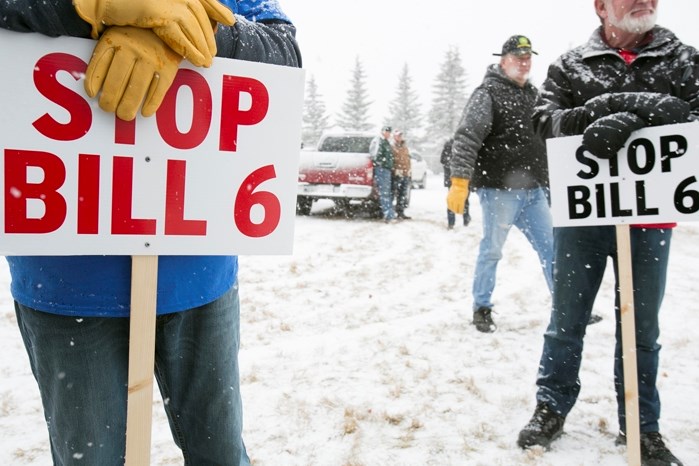After reading, and listening, to some of the reaction to Bill 6 (the Enhanced Protection for Farm and Ranch Workers Act) there are a couple of thoughts that I would like to share.
Some individuals and organizations are expressing a strident, vocal opposition to Bill 6. There are also inflammatory, and frankly, ill-informed, statements being made about the scope and impact of the changes. And unfortunately these statements are gaining attention within the agriculture community, the mass media, and the general public.
While no one, myself included, appreciates the imposition of additional cost and regulation on their business, I think there are good reasons why everyone in agriculture should be accepting of Bill 6, and demonstrating leadership implementing it.
As an operator of a true family farm, where my family does all the work, I have no employees, and all my modest income comes from farming, I do not appreciate it when my challenges, and my situation, are invoked as justification for large, multi-million dollar farming operations, with full-time employees, to not have to use the same practices as other businesses of similar size.
I have every respect for the ambition and effort it has taken to establish a large, successful operation. And of course I have sympathy with the challenges every farm faces regardless of size.
But if you want the benefits, and the income, that come from a large operation, then you should also be willing to accept the responsibilities that the suppliers, tire shops, and oil service companies that you rely upon (and where you would expect your children to be treated fairly and come home uninjured when they work there) have managed to deal with for years.
More importantly, I am concerned about the damage to the reputation and political capital of the farming community that strident opposition to this act will cause.
When individuals speak out against Bill 6, their fear of involvement of outsiders in their personal life is understandable. A family farm is not just a business; it is also a home. And the notion that investigators could enter your home, and direct you on how to run it, of course invokes a strong and emotional reaction.
But keep in mind when you speak out against Bill 6, you are doing so in a year in which five children died on Alberta farms, and where one of these incidents received substantive, sustained, and national coverage in the mass media.
As a result, many people who have limited familiarity with the reality of farm life are now aware of the issue of farm safety. And it is hard to conceive of a more emotionally engaging way they could have been made aware of the issue.
I appreciate that those who speak out against Bill 6 are sincere in presenting themselves as defending the privacy, individualism and independence that brought them to, and keeps them in, farming.
But the reality is that after five tragic deaths this summer, any position not entirely supportive of farm safety in any form, no matter how sincere the speaker's intentions are, will result in that speaker being perceived by people not directly involved with primary agriculture as greedy, mercenary monsters.
And in politics, perception is far more important than reality.
Bill 6 extends the same protections to farm workers that every other employee in Alberta already has. For the majority of urban residents, who form the bulk of voters in this province, it is the norm and expected. That their fellow citizen does not have these protections, simply because they drive a tractor instead of a backhoe, is considered an outrage.
There is nothing that will delay or prevent the proclamation and implementation of Bill 6. It is a cornerstone of the current government's platform, it is an emotionally engaging issue, and is perceived as overdue and entirely appropriate to the vast majority of voters. The only outcome of non-constructive opposition to Bill 6 will be damage to agriculture's reputation in the mind of the general public.
This does not mean you need be silent. Constructive input, identification of unintended impacts of the changes, participation in the regulatory development effort, and suggestions on how to streamline the process, are welcome and will be perceived positively by all involved. And are far more likely to be heard and acted upon by government than outrageous statements without factual basis.
So why does the general public's opinion of how farmers react to Bill 6 matter? Because in comparison to the political and regulatory challenges that will impact farming in the next few years, Bill 6 is not worth harming our good reputation over.
There will be substantive action on climate change. The regulation of agronomic practices (GMOs, insecticides, herbicides) will expand. Tractability will become a requirement for a wider range of products. The policies restricting ownership, transfer and development of agricultural land that are common in other jurisdictions will be considered for Alberta. Access to water will become a critical issue. Concerns over the use of crops for fuel instead of food will return.
These are issues that will have a far more substantive impact on the economics and practice of farming. And given that those primarily involved in agriculture are a shrinking minority of voters in Alberta, we are going to need the support of the public beyond our immediate industry if we are going to find solutions to these issues where the balance of economics, practicality and political reality comes out in our favour.
And when the time comes to address these issues, I want agriculture in Alberta to be able to point to leadership in providing safe and fair workplaces as one of the many reasons why the general public should trust our input and have empathy for our position.
Mark Olson
Carstairs

